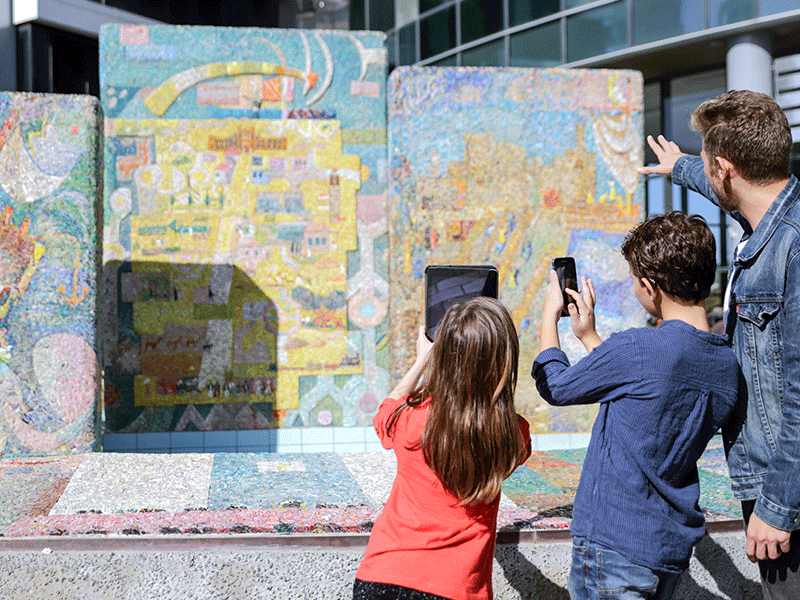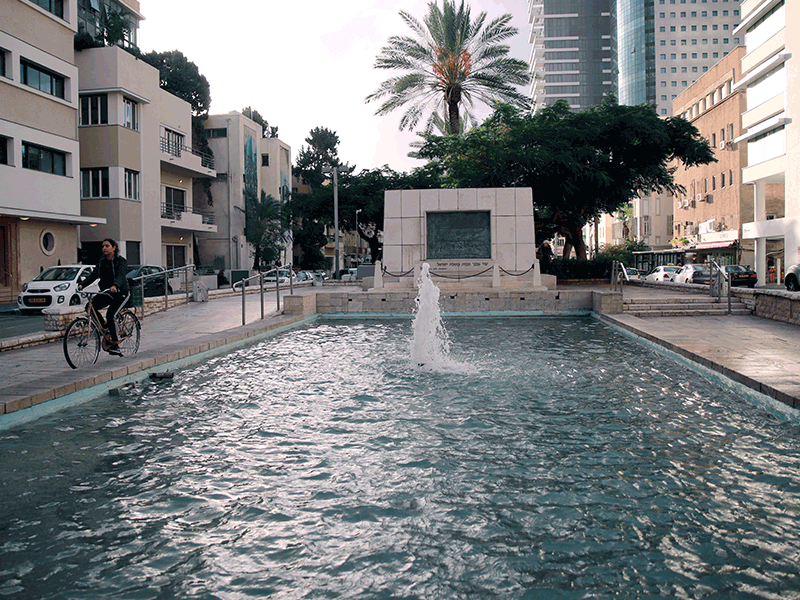Tel Aviv is staking a place for itself in Israel’s upcoming 70th birthday celebrations with a new heritage site: the Independence Trail. Featuring a golden track that runs along city sidewalks and lights up at night, the Independence Trail will use technology to link visitors to 10 historic sites, including four central museums offering free admission in 2018.
Inspired by similar self-guided heritage walking tours in cities like Boston, the Independence Trail will use a free app with the latest GPS technology to share photos, video clips and augmented reality for each site. The tour weaves the history of Israel’s pre-state and early years through the bustling modern streets of Tel Aviv.
At the time of independence in 1948, one-third of the country’s Jews lived in Tel Aviv, making the city’s story intrinsic to the story of Israel, a connection the city aims to drive home through the sites featured along the trail.
READ: DISABILITY DOESN’T MEAN YOU CAN’T ENJOY ISRAEL

Tel Aviv’s founding in 1909 was revolutionary in three ways, said city spokesperson Eytan Schwartz at a preview event to inaugurate the Independence Trail. “It was the first Hebrew city – an experiment in Jewish self-governance – it was a green revolution, centred around Rothschild Boulevard, which was lined with trees, and it was a cultural revolution,” featuring galleries, museums, movies, theatre, opera and music right from its earliest days.
The most significant stop on the tour is probably Beit ha-Atzmaut (Independence Hall), the former art gallery where David Ben-Gurion and other leaders gathered on May 14, 1948 to declare Israel’s independence. “It was chosen because it had thick walls,” Schwartz said, “in case they needed protection from the Egyptian air force.” The building is also set back from the street by several stairs, creating a security barrier, should it have been necessary.
The decision to choose that building may have been pragmatic, but it also spoke to the founders’ deep respect for culture. “How many countries can say they were born in an art museum?” Schwartz asked.
Although Independence Hall will still be visible on the tour, the building itself is being closed for an urgently needed renovation and upgrade, which is expected to take three years. The building’s exhibits will be housed temporarily in the nearby Shalom Meir Tower.
Other stops on the tour include the Nachum Gutman fountain, elaborately decorated with mosaics relating thousands of years of Tel Aviv-Jaffa history, a brand-new visitors centre at the Bank of Israel, the home of Akiva Aryeh Weiss, leader of the first core group of 60 founding families who bought a plot of land outside Jaffa and divided it among themselves, and the massive Great Synagogue on Allenby Street.
 Schwartz said including the Great Synagogue on the tour was “super important,” despite Tel Aviv’s markedly secular image. The synagogue, he explained, symbolizes the city’s unity, bringing Ashkenazim and Sephardim together, and despite the lack of a predominantly religious community in the surrounding area, “the city’s founders had great respect for religion.”
Schwartz said including the Great Synagogue on the tour was “super important,” despite Tel Aviv’s markedly secular image. The synagogue, he explained, symbolizes the city’s unity, bringing Ashkenazim and Sephardim together, and despite the lack of a predominantly religious community in the surrounding area, “the city’s founders had great respect for religion.”
The city is also in the early stages of planning a complete overhaul of the synagogue’s exterior, removing arches and surrounding walls added in the 1970s that conceal the building’s domed roof. “We want to return it to its former glory,” Schwartz said.
The cost of building the Independence Trail was 10 million shekels ($3.7 million), of which half was funded by the City of Tel Aviv and 25 per cent each from Israel’s Ministry of Tourism and Ministry of Jerusalem Affairs and Heritage. However, according to Schwartz, repairs to declining downtown infrastructure added another 10 million shekels to the city’s tab.
The Independence Trail will officially open on April 19, the 70th anniversary of Israel’s Independence Day, according to the Jewish calendar. City staff will be on hand daily with information and route maps in eight languages. In addition to the four museums on the route offering free admission (either permanently or through the end of 2018), a temporary 50-seat domed theatre, known as the Democracy Pavilion, will also offer free screenings of a 360-degree movie highlighting Israel’s and Tel Aviv’s shared history.
At only one kilometre in length, with plenty of family-friendly play areas and hip, urban buzz, the City of Tel Aviv hopes the Independence Trail will offer individuals and groups of all ages an accessible, entertaining way to rediscover the beating heart at the centre of Israel’s past, present and future.
